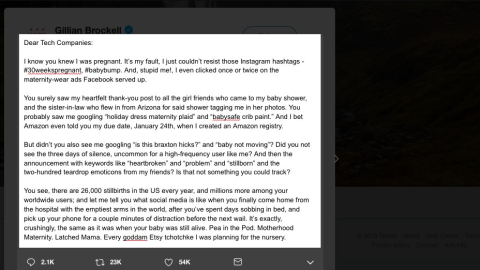Heart-wrenching letter confronts tech companies’ accidental cruelty

Gillian Brockell's letter posted on Twitter (Twitter)
- Advertisers are increasingly using hyper-specific information on users, collected by big tech companies, to sell products.
- An open letter published Tuesday outlines how this kind of ad targeting can be not only creepy, but also inadvertently cruel and distressing.
- Also on Tuesday, the House questioned Google’s CEO, partly on issues related to data privacy.
If you search for any product online, you’re virtually certain to see that same product or similar items appear in online advertisements over the next few weeks. That’s because big tech companies record and sell your data to advertisers so they can try to sell you stuff.
These data profiles have become so specific, so personalized in recent years that companies can discern a sobering amount of information about you. They can, as many stories have highlighted, even predict when women are pregnant, sometimes before women themselves realize they are, and start advertising advertising baby products to them.
But what happens when the pregnancy goes wrong? It turns out that the very-much-unwanted ads for maternity products don’t stop coming, as Gillian Brockell, a video editor at The Washington Post, described in an open letter to big tech companies about her experience with targeted ads in the wake of the stillbirth of her baby.
Read the open letter via Washington Post
Dear Tech Companies:
I know you knew I was pregnant. It’s my fault, I just couldn’t resist those Instagram hashtags — #30weekspregnant, #babybump. And, silly me! I even clicked once or twice on the maternity-wear ads Facebook served up. What can I say, I am your ideal “engaged” user.
You surely saw my heartfelt thank-you post to all the girl friends who came to my baby shower, and the sister-in-law who flew in from Arizona for said shower tagging me in her photos. You probably saw me googling “holiday dress maternity plaid” and “babysafe crib paint.” And I bet Amazon even told you my due date, January 24th, when I created that Prime registry.
But didn’t you also see me googling “braxton hicks vs. preterm labor” and “baby not moving”? Did you not see my three days of social media silence, uncommon for a high-frequency user like me? And then the announcement post with keywords like “heartbroken” and “problem” and “stillborn” and the 200 teardrop emoticons from my friends? Is that not something you could track?
You see, there are 24,000 stillbirths in the United States every year, and millions more among your worldwide users. And let me tell you what social media is like when you finally come home from the hospital with the emptiest arms in the world, after you and your husband have spent days sobbing in bed, and you pick up your phone for a few minutes of distraction before the next wail. It’s exactly, crushingly, the same as it was when your baby was still alive. A Pea in the Pod. Motherhood Maternity. Latched Mama. Every damn Etsy tchotchke I was considering for the nursery.
And when we millions of brokenhearted people helpfully click “I don’t want to see this ad,” and even answer your “Why?” with the cruel-but-true “It’s not relevant to me,” do you know what your algorithm decides, Tech Companies? It decides you’ve given birth, assumes a happy result, and deluges you with ads for the best nursing bras (I have cabbage leaves on my breasts because that is the best medical science has to offer to turn your milk off), DVDs about getting your baby to sleep through the night (I would give anything to have heard him cry at all), and the best strollers to grow with your baby (mine will forever be four pounds, one ounce).
And then, after all that, Experian swoops in with the lowest tracking blow of them all: a spam email encouraging me to “finish registering your baby” with them (I never “started,” but sure) to track his credit throughout the life he will never lead.
Please, Tech Companies, I implore you: If your algorithms are smart enough to realize that I was pregnant, or that I’ve given birth, then surely they can be smart enough to realize that my baby died, and advertise to me accordingly — or maybe, just maybe, not at all.
Regards,
Gillian
The House questions Google
The open letter was published the same day that the House Judiciary Committee questioned Sundar Pichai, CEO of Google, about data privacy, China and free speech. But mostly the hearing was bogged down by partisan bickering and a fixation on concerns of anti-conservative bias at the tech giant.
However, there was at least one moment that reveals how Google feels about privacy concerns. Rep. Karen Handel (R-GA) asked Pichai whether he thinks there are any categories of data for which users should have to opt-in, rather than manually opt-out, in order to have it collected.
“I think a framework for privacy where users have a sense of transparency, control, and choice, and a clear understanding of the choices they need to make is very good for consumers,” Pichai said.
In other words, as Wired‘s Issie Lapowsky noted, he thinks Google’s privacy policies are just fine the way they are.





